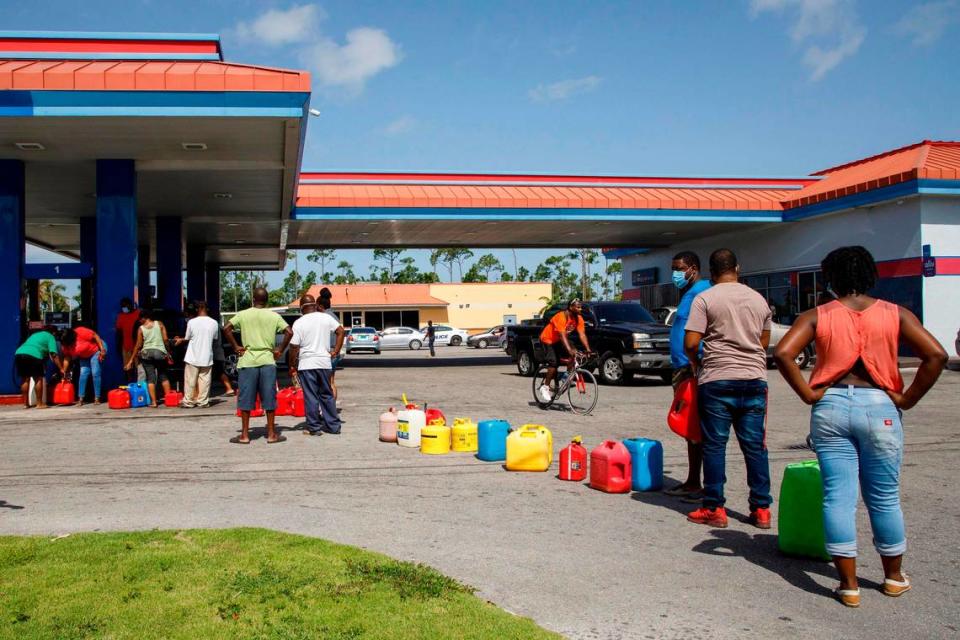As Hurricane Isaias crosses Bahamas, hurricane shelters could become COVID ‘tinder box’
With Hurricane Isaias making its way through the Bahamas chain, residents who may not feel safe in their flood-prone homes are being advised to first seek shelter with host families and only go to a shelter if they need to.
“If you find there is nobody to host you then you need to report to one of the shelters so that you and your family can be safe,” Lillian Quant-Forbes, the director of social services, said Friday.
The advice comes as the country is experiencing a surge in coronavirus infections.
During a joint press conference Friday with health and emergency management officials, newly appointed Health Minister Renward Wells confirmed that the country is experiencing a second wave of COVID-19 infections, which has now spread beyond the island of New Providence, where the capital of Nassau is located, to several of the family islands.
“The statistics confirm that the Bahamas is in a surge,” Wells said. “The COVID-19 surge has put a significant strain on resources, including the bed capacity of our health system.”
He said beds were being reconfigured at the country’s public hospitals to accommodate patients and “every effort is being made to mitigate the spread of COVID-19 within our institutions.”
“This rate of increase is worrisome and puts pressure on our health system capacity,” Chief Medical Officer Dr. Pearl McMillan said. “If allowed to go unchecked our health system could collapse. Our economy will undergo undue stress and our society will have unwelcome social chaos.”
Of the 574 registered cases in the nation, 275 are active cases on the island of Grand Bahama, where they can be traced back to recent U.S. travel, parties and a recent funeral that drew people from three different islands that later saw spikes. The health ministry also said that there were hundreds of people in quarantine, many of them on Grand Bahama. The island is seeing record-breaking increases after two months of no cases and is among the islands expected to be slammed by Isaias’ heavy rains and gusty winds.

Asked during the press conference how managers at the country’s 115 shelters planned to manage individuals who may be in quarantine, Quant-Forbes said they are aware such a scenario may happen.
“We’ve indicated that at each shelter we will try our best to identify safe zones for those persons,” she said. “If we can quadrant off a space in the place or identify rooms specifically for those persons to be in than that is what we will do.”
The Bahamas, which has stressed that face masks will be obligatory during shelter stays and social distancing will be enforced, is not the only country facing the dilemma of keeping people safe during the storm in the midst of a pandemic. But being the first Caribbean nation being confronted with a hurricane this season, it may end up being the first to test the concept.
Miami-Dade County, for example, plans to open 82 shelters or more this hurricane season instead of the 20 opened during Hurricane Irma. That will allow for Miami-County to offer each evacuee 36 square feet, as opposed to the usual 20.
Florida is recommending counties open enough shelters to give each evacuee 60 square feet of space. In addition, Miami-Dade plans to use ultraviolet fans to disinfect the air inside shelters.
Miami-Dade said it will screen each evacuee for COVID-19 and place possibly infected people in one area and uninfected people in another. If they’re available later in the season, the state plans to deploy rapid COVID-19 tests that return results within an hour.
Each evacuee in Miami-Dade will be given a kit with a mask, gloves, hand sanitizer and disinfectant wipes. Florida said it has a reserve of 10 million masks, 5 million gloves, a million face shields, 5,000 thermometers and 200 negative-pressure machines for hurricane season.
Florida also developed an app that will help evacuees book hotel rooms to shelter while isolating.
Quant-Forbes said the Bahamas will also make COVID-19 kits available to those arriving at shelters, but she also asked individuals to walk in with face masks.
Concerns over infections spiking have been evident throughout the storm’s preparations as health officials and the country’s prime minister, Hubert Minnis, repeatedly warned Bahamians this week to act responsibly.
After putting the country under lockdown last week after cases began increasing, Minnis announced a relaxing of the measures while warning that they will return after the storm’s passing.
Gilbert Morris, a Bahamas-born economist and university professor who has criticized the government’s handling of the pandemic, said concerns about COVID-19 spiking in the midst of the storm preparations and after are real.
In a report he wrote earlier this year, Morris called for the creation of COVID-free zones that would allow the country to keep its population safe while still welcoming tourists.
Considering guidelines from the World Health Organization and U.S. Centers for Disease Control and Prevention on how to stay safe from the pandemic, he and others say shelters doesn’t always allow for that and in some cases could become a “tinder box.”
“You have hotels siting empty and I just don’t understand that,” Morris said. “Why do we have all of these empty hotel rooms and we‘re not using that to separate the population out?”

